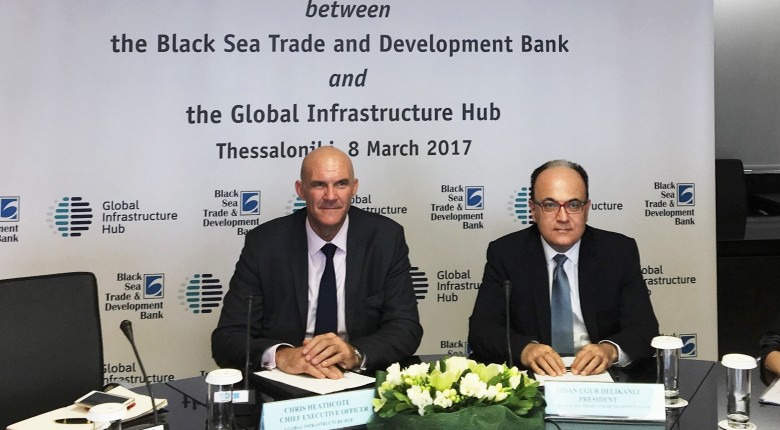Filter by
209 results found
News
GI Hub Chief Executive Officer Chris Heathcote spoke on developing bankable infrastructure projects at the Global Infrastructure Initiative 2017 in Singapore this month.
Read time: 1 minute
Published
01 Jun 2017
View news


News
The GI Hub's Richard Timbs gave an overview on infrastructure development in Latin American countries at the Latin American Infrastructure Forum 2017 held in Melbourne, Australia yesterday.
Mr Timbs also spoke on the function of the Hub's Project Pipeline, and it's potential to help countries secure private sector interest for their infrastructure projects.
Read time: 1 minute
Published
23 May 2017
View news


News
The Global Infrastructure Hub is today launching its new online tool, InfraCompass, to guide governments on how to create the best conditions for infrastructure delivery.
Read time: 1 minute
Published
15 May 2017
View news


News
The GI Hub has signed a MoU with the Global Infrastructure Connectivity Alliance (GICA).
GICA, which was launched by the G20, aims to enhance cooperation and synergies of existing and future global infrastructure and trade facilitation programs seeking to improve connectivity within, between and among countries.
Read time: 1 minute
Published
08 May 2017
View news


Reports and reference guides
Una guía en español para ayudar a los países en desarrollo a evaluar el riesgo de inversión de infraestructura para proyectos del sector transporte en contratos de Asociación Público-Privada (PPP) ya está disponible a través de la página web del Global Infrastructure Hub (GI Hub).
Read time: 1 minute
Published
30 Mar 2017
View news


News
A Memorandum of Understanding (MoU) between the Global Infrastructure Hub (GI Hub) and the Black Sea Trade and Development Bank (BSTDB) has been signed at the BSTDB headquarters in Thessaloniki, Greece.
Read time: 1 minute
Published
08 Mar 2017
View news


News
Mobilising private investment to deliver public infrastructure projects was the focus of the Global Infrastructure Hub’s 2017 Conference held in Mexico City, Mexico on May 29 and 30, 2017.
Read time: 1 minute
Published
30 May 2017
View news


Published
17 May 2017
View news


News
As part of its leading practices mandate, the GI Hub is developing a set of annotated risk allocation matrices for PPP transactions, in a variety of sectors.
Read time: 1 minute
Published
10 May 2017
View news


News
GI Hub Chief Executive Officer Chris Heathcote addressed the Business Council for International Understanding at a lunch hosted by Australia’s Ambassador to the US Joe Hockey in Washington DC recently.
Read time: 1 minute
Published
01 May 2017
View news


News
Global infrastructure needs and Public-Private Partnerships were discussed when the Foreign Correspondents’ Association of Australia met the GI Hub today.
Read time: 1 minute
Published
20 Mar 2017
View news


News
Mark Moseley, the GI Hub’s Senior Director for Legal Frameworks and Procurement Policies gave a presentation at a seminar on Future Ready: Sustainable Cities – Indonesia Infrastructure in Focus held in Jakarta, Indonesia on 7 March 2017.
Read time: 1 minute
Published
07 Mar 2017
View news


News
The GI Hub presented at the China Public-Private Partnerships Center's International Symposium on the Good Practices of China's PP held in Beijing.
The GI Hub's Richard Timbs gave a presentation on global PPP trends, while the Hub's Mark Moseley moderated a session on PPP Risk Allocation at the session held on May 18, 2017.
As well, the Chinese version of the Hub's PPP Risk Allocation tool, Allocating Risks in PPP Contracts, was launched.
Read time: 1 minute
Published
24 May 2017
View news


News
The GI Hub has launched a new online tool, InfraCompass. What is InfraCompass and how can it help governments? The GI Hub's Chief Executive Officer, Chris Heathcote, explains.
Read time: 1 minute
Published
17 May 2017
View news


News
The G20’s Global Infrastructure Hub has welcomed the Australian Government’s commitment in the 2017 Budget to building more infrastructure across Australia.
Read time: 1 minute
Published
10 May 2017
View news


News
Asian Infrastructure Investment Bank President Mr Jin Liqun met Global Infrastructure Hub Chief Executive Officer Chris Heathcote at the GI Hub’s Sydney office on April 3, where both parties provided briefings on their key work.
Discussion focused on the GI Hub’s report undertaken for the G20 on the role of Multilateral Development Banks in “crowding-in” private finance for public infrastructure, which was released earlier this year. The GI Hub has already been in discussions with the AIIB on the recommendations in the report.
Read time: 1 minute
Published
06 Apr 2017
View news


News
Global Infrastructure Hub Chief Executive Officer Chris Heathcote says quality public infrastructure can promote greater affluence and spark global growth.
Mr Heathcote told a Public-Private Partnership Seminar in Athens that “infrastructure changes lives and changes economies”.
Read time: 1 minute
Published
15 Mar 2017
View news


News
Report reviewing the extent to which Multilateral Development Banks (MDBs) create incentives within their organisations to ‘crowd-in’ private finance to fund public infrastructure.
Read time: 1 minute
Published
15 Feb 2017
View news






















